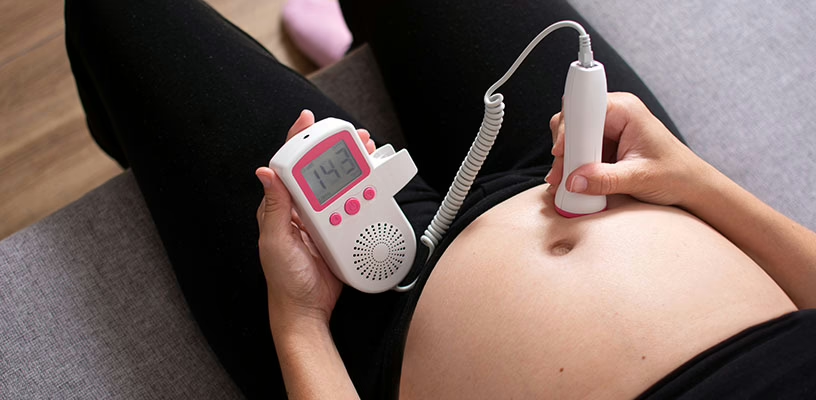When Can You Hear Your Baby’s Heartbeat?
One of the most exciting moments in every pregnancy is the first time you hear your baby’s heart beating. That little “thump-thump” lets you know that your baby is healthy and growing well.

If you’re eager to dance to the rhythm of your baby’s heart, let’s find out when you can expect to hear it—and cover everything else there is to know about how his heartbeat will develop.
When can you first hear your baby’s heartbeat?
The heart is one of the first organs to develop. Its formation begins just 3 weeks into your pregnancy. However, you probably won’t be able to hear it before your 12th week of pregnancy. 1
Your baby’s heart: a developmental timeline
Here’s a timeline of the key events in your baby’s cardiovascular development during different weeks of your pregnancy:
- Week 3 to week 4: Your baby’s heart begins developing during the third week, and by the fourth week, it starts pulsing in rapid and irregular contractions. 2
- Week 6: Though your baby’s heart is still not fully formed, your doctor can detect cardiac activity known as a “flutter” (though you won’t be able to hear it yet). At this point, a group of cells within your baby’s “proto-heart” begin firing electrical signals, causing those first flutters. 3
- Week 7 to week 9: Your baby’s heart continues to develop, with the chambers and valves beginning to take shape. By week 9, his heart rate reaches around 170 bpm before beginning to slow. 2 Your baby’s cardiac activity will count as a genuine fetal heartbeat once he develops the chambers of his heart, around week 10. 4
How will your baby’s heart function throughout your pregnancy?
Your baby uses his heart differently in your womb than he will after birth.
Because he can’t use his lungs to breathe just yet, your placenta sends oxygenated blood (and nutrients) to him through the umbilical cord.
This blood travels through three passages (known as “shunts”) in his body. Think of these as shortcuts that bypass your baby’s lungs and liver, which aren’t fully operational yet, to circulate blood throughout his system. The three shunts are known as the ductus arteriosus, ductus venosus, and foramen ovale. 5
When your little one comes into the world, his organs will start functioning normally, and these shunts will disappear.
Your baby’s heartbeat and the odds of miscarriage
You’ll be glad to know that once you hear your baby’s heartbeat, statistically, the chances of miscarriage drop.
One study shows that once your baby has a heartbeat (usually around 6–7 weeks in), your risk of miscarriage drops to about 1.6%. 6
How can you detect your baby’s heartbeat?
As you’ve probably gathered, it’s normal for your baby’s heart rate to be faster than an adult’s (potentially up to twice as fast).
After hitting around 170 bpm at 9 weeks, your little one’s heartbeat will slow to around 120–160 bpm during the second and third trimesters. 7 During labor, it should stay between 110 bpm and 160 bpm. 8
Here’s how your doctor will measure your baby’s heartbeat throughout your pregnancy:
Doppler
A fetal Doppler ultrasound can pick up your baby’s heartbeat. This will likely be the first time you’ll hear his heart (during a scheduled appointment with your OB).
Fetal heartbeats are sometimes audible by Doppler devices around week 10 to week 12 of pregnancy, but sometimes it takes a bit longer—up to week 14 to week 16, particularly when the expectant mom is obese or has a retroverted (tilted) uterus.
At-home Doppler devices
Some parents can’t wait for this appointment and buy home-use Doppler devices in the hopes of hearing their baby’s heartbeat on their own.
However, experts advise against this. At-home Doppler devices are much less sophisticated than the ones doctors use. They’re less accurate, and can mistakenly pick up sounds from your own heart or your placenta.
Moreover, using a Doppler correctly requires training. Without it, the odds are good that you won’t hear a heartbeat at all (something that often causes parents to worry
Ultrasound
You’ll also get to hear your baby’s beating heart in some of your pregnancy ultrasounds. You’ll have several of these scans throughout your pregnancy:
- Early transvaginal ultrasound: Your doctor uses this ultrasound to calculate your due date and detect initial cardiac activity, which, as mentioned, starts when you’re around 6–7 weeks pregnant. 9 This may be visible as a faint “flickering,” but you won’t actually get to hear a heartbeat at this stage.
- Anatomy or gender scan: Your OB will conduct a more detailed ultrasound when you’re around 20 weeks pregnant. You’ll then be able to see your child’s heart chambers more clearly (and, incidentally, find out his sex—one of the big appeals of the anatomy scan). 10
- Fetal echocardiogram: If you have a family history of heart defects or other indications, your OB might suggest a fetal echocardiogram (a specialized heart ultrasound). If so, you’ll usually get this test when you’re between week 18 and week 24 of your pregnancy. 11 12
Note that your baby’s heartbeat has nothing to do with his sex and isn’t one of the signs of having a boy or girl. 13 Some people claim that baby boys and girls have different heart rates, but this is a myth.
Stethoscope
What about hearing your baby’s heartbeat with a good, old-fashioned stethoscope? While this is one of the most exciting ways to hear your baby’s beating heart, you’ll need to be patient.
Usually, you’ll be able to hear his heartbeat with a stethoscope around week 20 of your pregnancy.
What does it mean if you can’t detect a heartbeat?
It’s understandable to be worried if your OB can’t detect your baby’s heartbeat. However, that’s not always a sign that something’s wrong.
Here are a few possible reasons why your doctor can’t pick up the pitter-patter of your little one’s heart just yet:
- Gestational age: You might have your due date wrong (which is entirely possible even if you used an online due date calculator to determine it—these tools are useful, but not foolproof). It could just be too early to detect a heartbeat.
- Body size: If you’re obese, it can be harder to detect your baby’s heartbeat.
- Uterine position: If you have a tilted uterus, also known as a retroverted uterus, this can also make detecting your baby’s heartbeat more challenging.
If your OB can’t detect a heartbeat during your initial appointment, they’ll probably schedule you for a follow-up appointment to recheck it in a week or two.
When can failure to detect a heartbeat indicate a problem?
To reiterate, not hearing your baby’s heartbeat isn’t necessarily anything to worry about, especially in the early days. However, there are times when it can signal an underlying issue.
Miscarriage
If you can’t hear your baby’s heartbeat, it’s (unfortunately) possible that you had a miscarriage. This is more likely if you also experienced the other signs of a miscarriage, such as: 14
- Vaginal bleeding/spotting (although occasional blood in your pregnancy discharge can also be normal)
- Severe cramping or belly pain
If you experience any of these symptoms, speak to your doctor immediately.
Ectopic pregnancy
An ectopic pregnancy is a type of nonviable pregnancy that occurs when a fertilized egg implants outside of the uterus, usually in the fallopian tube. 15 The embryo will be unable to survive.
An ectopic pregnancy is a serious condition that requires immediate treatment. Although your body may absorb the embryo without intervention, there’s a chance it will continue to grow, eventually rupturing your fallopian tube. This can cause a life-threatening hemorrhage.
The symptoms of an ectopic pregnancy can sometimes have similar symptoms to various types of miscarriage. Speak to your doctor immediately if you have any of the following symptoms: 15
- Severe belly pain (commonly on one side)
- Vaginal bleeding (unrelated to your period—if you’re still menstruating, you don’t have an ectopic pregnancy)
How to keep your baby’s heart healthy
You can support your little one’s heart health by:
Taking your prenatal vitamins
Don’t skip the prenatal vitamins. They provide essential nutrients for your baby’s development.
Folic acid, one of the key prenatal vitamins, is mainly necessary to prevent nervous system defects, but some studies show that it may prevent your baby from developing heart defects, too.
Be mindful of the potential side effects of prenatal vitamins, including nausea. Talk to your doctor if your morning sickness becomes unmanageable.
Quitting smoking or vaping
Smoking or vaping while pregnant will cause serious issues for your baby. It restricts the amount of oxygen he has access to in the womb, meaning his heart will need to beat much harder than normal. 16
These activities also increase the chances of stillbirth. Even if your baby’s relatively healthy at birth, smoking while he’s in the womb could make him more prone to becoming asthmatic later in life. 17
Avoiding alcohol
As you may already know, you should avoid alcohol entirely during pregnancy. Drinking alcohol leads to a number of fetal alcohol spectrum disorders (FASDs), which in turn can cause: 18
- Low birth weight
- Developmental delays
- Visual or hearing impairment
Drinking when you’re pregnant also puts your baby at risk of poor growth, decreased muscle tone, and other problems. 19
Final thoughts
There are few moments as exciting as hearing your baby’s heartbeat for the first time. You may find it hard to wait, but do your best to be patient and think of it as something to look forward to. As always, give your doctor a call if you have any concerns or problems.
Article Sources
- UnityPoint Health. "Pregnancy: What to Expect in Your First Trimester (Weeks 1-12)" Retrieved May 7, 2025.
- Journal of Prenatal Medicine - NCBI. "Fetal cardiac function during the first trimester of pregnancy" Retrieved May 7, 2025.
- Live Science. "Is a 'fetal heartbeat' really a heartbeat at 6 weeks?" Retrieved May 7, 2025.
- Medical News Today. "When does a fetus have a heartbeat?" Retrieved May 7, 2025.
- University of Rochester Medical Center. "Blood Circulation in the Fetus and Newborn" Retrieved May 7, 2025.
- Obstetrics & Gynecology. "Miscarriage risk for asymptomatic women after a normal first-trimester prenatal visit" Retrieved May 7, 2025.
- Radiopaedia.org. "Fetal heart rate in the first and second trimester" Retrieved May 7, 2025.
- The University of Texas Southwestern Medical Center. "What fetal heart rate monitoring can – and can’t – tell us" Retrieved May 7, 2025.
- The University of Texas Southwestern Medical Center. "Patience is key: Understanding the timing of early ultrasounds" Retrieved May 7, 2025.
- Penn Medicine Lancaster General Health. "All About the 20-Week Anatomy Scan" Retrieved May 7, 2025.
- American Heart Association. "Fetal Echocardiogram Test" Retrieved May 7, 2025.
- American Heart Association. "Fetal Echocardiography / Your Developing Child's Heart" Retrieved May 7, 2025.
- Fetal Diagnosis and Therapy. "Gender-related differences in fetal heart rate during first trimester" Retrieved May 7, 2025.
- Planned Parenthood Federation of America Inc.. "How do I know if I’m having a miscarriage?" Retrieved May 7, 2025.
- Johns Hopkins Medicine. "Ectopic Pregnancy" Retrieved May 7, 2025.
- National Health Service. "Stop smoking in pregnancy" Retrieved May 7, 2025.
- American College of Obstetricians and Gynecologists. "Tobacco and Pregnancy" Retrieved May 7, 2025.
- The University of Texas Southwestern Medical Center. "Drinking while pregnant: What we know and what we don’t" Retrieved May 7, 2025.
- University of Florida Health. "Fetal alcohol syndrome" Retrieved May 7, 2025.







